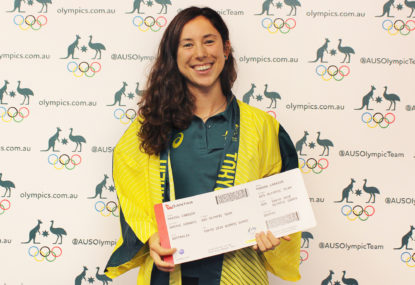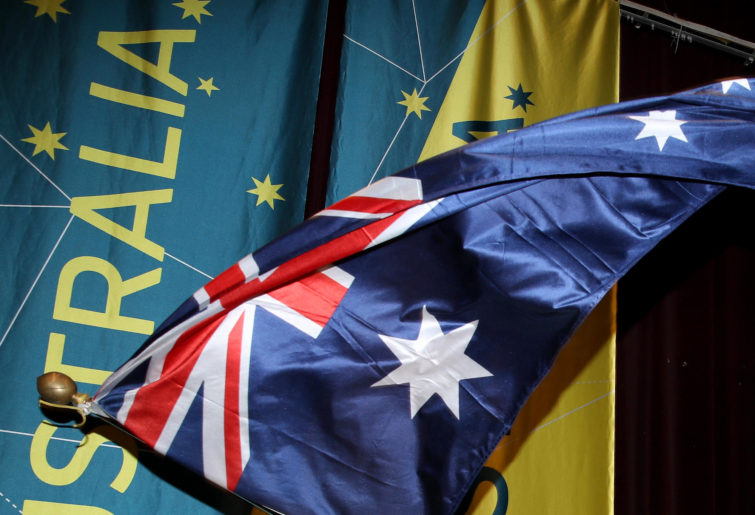'An iconic roster': LeBron, Steph, KD headline all-star cast for Team USA's shot at Olympic glory
LeBron James is going back to the Olympics for the first time in 12 years. Steph Curry is headed to the games for the…
Opinion

At age 13, Marina Carrier moved with her family to the United Kingdom after her dad had been given a job opportunity.
Up until that point, Carrier had been a child that had enjoyed a variety of sports, but like most other Aussie children she hadn’t heard of modern pentathlon.
That all changed when she was being shown around her new school and one of her teachers mentioned a sport that combined several disciplines including fencing, swimming, show jumping, shooting and running.
“After hearing that, my 13-year-old brain decided that even though I had never competed in any of the five disciplines, it was a great idea to start competing in all five at once,” says Carrier.
“I joined the school program straight away and absolutely loved it. Within a year, I was competing in the British Nationals for run, swim and shoot, which was pretty exciting.”
But then Carrier came back to Australia and left the sport.
That comes as no surprise. The sport is relatively small in Australia.
But it took one phone call from Olympian Edward Fernon before Carrier became immersed in the sport again and began thinking about competing at a higher level.
“I live in a small suburb and word travels fast,” she says.
“Somehow Ed got my number and it transpired that we lived around the corner from each other. The phone call essentially went like this: ‘Hello, this is Ed Fernon. I competed for Australia in the 2012 London Olympic Games in modern pentathlon. How would you like to be my training partner and try to make the youth Olympics in a year?’
“I couldn’t say no and Ed and I have been training together ever since.”
And now the pair will be heading to the Tokyo Olympics together.
Carrier was the seventh athlete to qualify for the Australian Olympic Team for Tokyo and when I spoke to her a week later, she was still finding it hard to believe.
“It is still all sinking in and is so surreal,” she says. “I keep having to look at pictures of myself in the media to understand that this is real. Those are photos of me. This is really happening”.

(Photo by Cameron Spencer/Getty Images)
Her qualification continues a run that has seen Australian women compete in every Olympic Games in the event since it was introduced in Sydney 2000. Carrier follows in the footsteps of women like Kitty Chiller and Chloe Esposito.
But like most athletes, Carrier has faced challenges on the path to her Olympic dream.
Her 2019 was injury-riddled. One of the most severe injuries was a femur bone stress, which meant she was unable to fence or run for several months leading into the November 2019 Oceania Championships.
Additionally, just like many other athletes, Carrier is juggling something other than her sport, which requires her to train seven days a week.
Carrier’s other focus is study and she is currently enrolled in a medical science degree at Sydney University. Carrier is extremely complimentary of the university and the way they have supported her in the lead-up to her Olympic qualification.
“The university has gone above and beyond,” she says.
“The elite athlete program and the various clubs, especially the athletics club, have been supportive beyond belief. I have always been able to shift assessments and exams.
“The lecturers and academics have also been really understanding. They have also always been excited to hear what you are trying to do. Especially with a quirky sport like modern pentathlon, they end up being very excited about it.”
While this juggle may be a challenge at times, one of the benefits of Carrier not being completely focused on her sport is that she has a remarkable sense of perspective and maturity when it comes to trying to manage a busy schedule.
Despite being only 23 years old, Carrier has a deep understanding of the importance of being not just physically strong, but being mentally strong and taking the time to look after herself.
“I dropped down to part time, because when things began ramping up in sport, I recognised that I was only human and there were only so many hours in the week,” says Carrier.
“It’s so important to have that balance. It’s a lesson I have learnt in the last year because of injury. No matter how dedicated you are, you are a human being first. If you aren’t a happy person, you can’t be a happy athlete.”
But for now, the countdown is on for Carrier with just five months until the Olympic Games.
The competition will see 36 men and 36 women compete in fencing (a ranking round and a bonus round), a 200-metre freestyle swim, show-jumping and the final, which will combine the run and laser shoot over 3200 metres.
Carrier’s parents will be in the crowd too, booking their flights as soon as Carrier’s spot was confirmed.
“They are quite excited by the whole thing. Mum is telling me about all the other events she is going to,” says Carrier.
But the most important event will of course be on Thursday 6 August, when the fencing ranking round will be held in Musashino Forest Sport Plaza and then – fingers crossed – the final of the women’s competition on Friday 7 August.